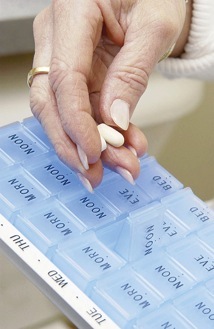-
Medications



Safe Use of Medications
-
•Things to tell your doctor:
-
-Things you have had an allergic reaction to.
-
-If you are pregnant or breast-feeding.
-
-If another doctor is also treating you.
-
-If you have diabetes or kidney or liver disease.
-
-If you use alcohol, tobacco, or drugs.
-
•See that your doctor has an up-to-date list of all the medicines you take. This includes prescribed and over-the-counter (OTC) ones, vitamins, and herbal supplements. Keep an up-to-date list in your wallet.
-
•Ask your doctor these questions: What is the medicine for? When should I take it? How long do I need to take it? Should I take it with or without food? Can I crush the pill or open up the capsule if I can’t swallow it whole? Write these things down so you don’t forget what was said.
-
•Tell your local and mail order pharmacist what medicines and supplements you take. List these on the form the health plan sends you. Harmful mixtures with other drugs and with foods can be identified.
-
•Keep medicines in their original containers or in ones with sections for daily doses.
-
•Let your doctor know about your past reactions to certain medicines. Tolerance levels may change with age. As some people age, they may be more sensitive to some medications, such as painkillers or sedatives.
-
•Ask about the possible side effects of a medication. Find out what you should do if you have any.
-
•Ask if you can drink alcohol while taking the medication(s). Alcohol can lessen the effects of some medicines. Other medicines, such as sedatives, can be deadly when used with alcohol.
-
•Don’t take someone else’s medication.
-
•Throw away medications that have expired.
-
•Try to reduce the need for some medications, such as sleeping pills or laxatives. A hot bath and a glass of milk might help you fall asleep. Having more fiber in your diet can reduce or replace the need for a laxative. Check with your doctor on ways other than medicines to help treat your problem.
-
•Even if you feel better, don’t stop taking a prescribed medicine unless your doctor tells you to. Stopping some medications can be harmful. Also, don’t skip doses.
Your local or mail order pharmacist can answer questions about medications.
Containers with sections for daily doses and times can remind you when to take medicines.






Copyright © 2009, American Institute for Preventive Medicine. All rights reserved.